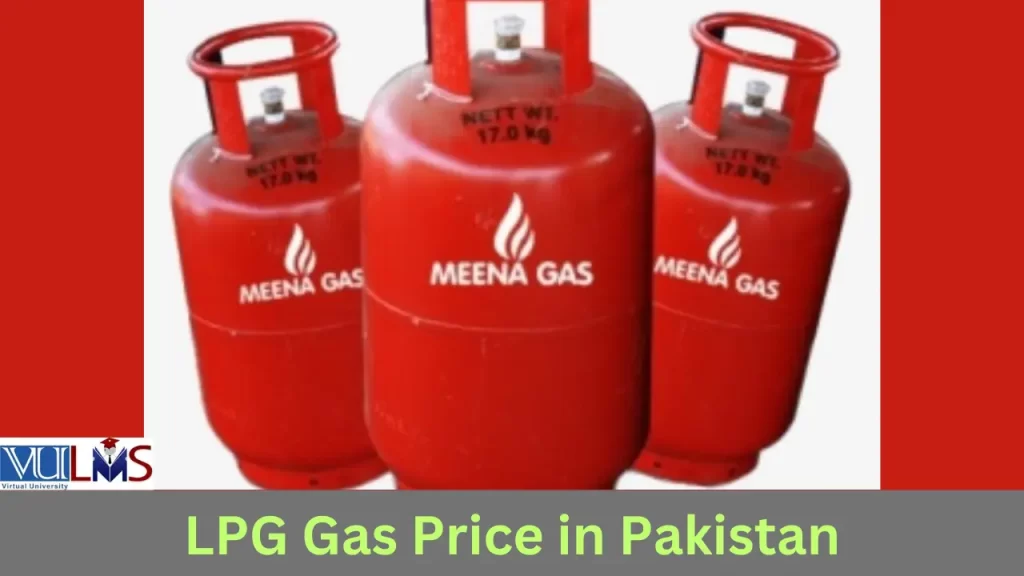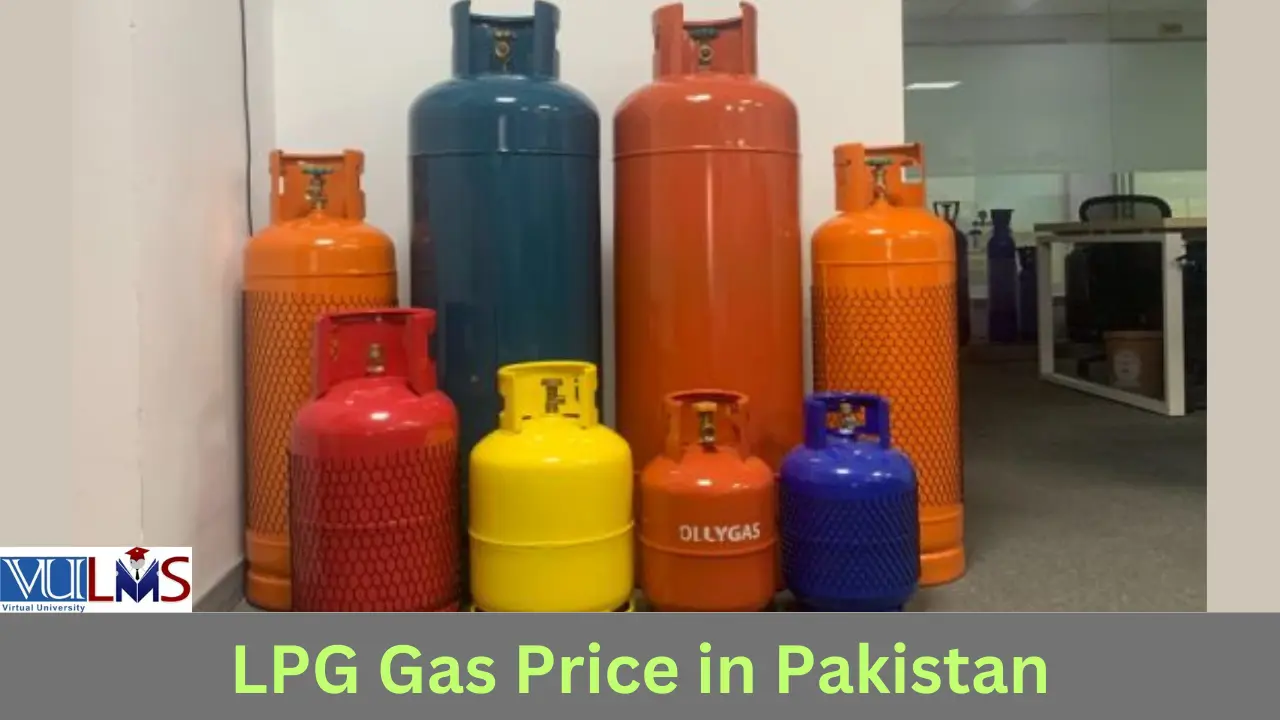LPG Gas Price in Pakistan Today 2024 | LPG Rate Per 1 KG
Have you ever wondered what factors influence LPG gas price in Pakistan? The price of essential items, such as LPG, is directly related to the cost of living. This piece will look at how much LPG gas costs in Pakistan right now, in the year 2024. What impact does it have on your household budget? What role does Ogra have in deciding these prices? Let’s go explore.

Current LPG Gas Price in Pakistan
As of today, Pakistan’s LPG gas price represents a dynamic landscape impacted by global market trends and regional considerations. allowing them to handle city-wise variances and make informed judgments in response to swings. To efficiently control your energy expenses, stay up to date on the newest advancements in LPG price.
Updates on LPG Prices in Real Time
The current price of LPG gas in Pakistan is an important piece of information for enterprises, businesses, and households alike. Making educated decisions regarding their energy expenses is made possible for consumers who keep track of real-time updates on LPG pricing.
| Weight | Rate |
|---|---|
| LPG per KG | PKR 300 to 350 |
| Domestic Cylinder 11.8 Kg | PKR 4,000 to 4,200 |
| Commercial Cylinder (45.4 Kg) | PKR 15,600 to 16,000 |
Also Read:
Benazir Income Support Programme Online Registration
Vulms Login – Virtual University of Pakistan
City-specific Differences
LPG costs vary from place to city in Pakistan; they are not all the same. Businesses and locals alike must grasp these city-specific differences to understand how price dynamics affect their local marketplaces.
| Punjab | Sindh | KPK | Balochistan |
|---|---|---|---|
| Lahore | Sukkur | Dera Ismail Khan | Kalat |
| Chishtian | Mehar | Bannu | Dera Bugti |
| Gujranwala | Pano Akil | Abbottabad | Loralai |
| Liaqatpur | Kashmore | Batkhela | Hub |
| Attock | Shahdadkot | Peshawar | Gwadar |
| DG Khan | Karachi | Naran Kaghan | Kech |
| Muzaffargarh | Badin | Mansehra | Kharan |
| Chakwal | Larkana | Mardan | Awaran |
| Rawalpindi | Mehrabpur | Nowshera | Jhal Magsi |
| Layyah | Shikarpur | Haripur | Harnai |
| Okara | Jacobabad | Chitral | Jafarabad |
| Faisalabad | Nawabshah | Charsadda | Chaman |
| Lodhran | Hyderabad | Landi Kotal | Kohlu |
| Multan | Sanghar | Swabi | Mastung |
| Mian Channu | Mirpur Khas | Hangu | Barkhan |
| Khanewal | Moro | Kabal | Lasbela |
| Khanpur | Daharki | Kohat | Khuzdar |
| Islamabad | Sukkur | Mingora | Duki (18) |
| Chakwal | Shikarpur | Charsadda | Lasbela |
Factors Affecting LPG Gas Price in Pakistan
A multitude of factors influence the variation of LPG prices.LPG price fluctuations stem from supply and demand shifts, global market trends, and geopolitical events. Additional factors, like storage costs, distribution logistics, and transportation expenses, impact the final pricing structure for consumers.
International Market Patterns
The state of the global market has a significant impact on LPG Gas Price in Pakistan. The pricing structure of LPG in Pakistan is directly affected by fluctuations in global markets, which are driven by geopolitical events, supply and demand dynamics, and energy policy.
Dynamics of Regional Supply and Demand
One major aspect influencing pricing is the regional balance between supply and demand for LPG. Differences in the ways that people consume, produce, and distribute goods within LPG prices are volatile overall, with certain regions contributing more than others.
Costs of Distribution and Transportation
Logistical challenges in distribution and transportation significantly influence the final cost of LPG to customers. Various factors, such as the cost of gasoline, infrastructure upkeep, and delivery logistics, shape the overall pricing structure.
Rules and Regulations
Government rules, especially those imposed by organizations like Ogra, have a significant impact on LPG costs. Regulatory frameworks support the stability and openness of the LPG market while guaranteeing fair practices and consumer protection.
Worldwide Geopolitical Occurrences
Global geopolitical developments may have an impact on LPG prices. Uncertainties arising from political tensions, conflicts, or shifts in international relations can impact the supply chain and lead to abrupt variations in LPG prices.
Economic Effects on Industries and Households
Variations in LPG prices have far-reaching economic effects that affect not just individual houses but also the larger industrial sector.
Variations in LPG Prices Affect Home Budgets
Fluctuating LPG Gas price in Pakistan strongly impact household budgets and also affect the prices of necessities like cooking and heating. By being aware of these variations, people can reduce the impact on their monthly spending by making well-informed decisions, which promotes adaptability and resilience in their finances.
Industrial Sector Reaction to Shifts in Prices
In response to fluctuations in LPG prices, the industrial sector employs a strategic approach by putting policies in place to maximize energy efficiency and minimize associated costs. This flexibility demonstrates the delicate balance between operational effectiveness and economic sustainability, providing insights into the adaptation of enterprises in the face of fluctuating energy costs.
Ogre’s Role in Determining Prices
The Oil and Gas Regulatory Authority (Ogra) is a major force in setting up and managing the LPG price structure in Pakistan.
Ogra LPG Gas Price
| Weight | Rate |
|---|---|
| LPG per KG | PKR 250.34 |
| Domestic Cylinder 11.8 Kg | PKR 2,950 |
| Commercial Cylinder (45.4 Kg) | PKR 11,360 |
- Regulatory Frameworks and Guidelines: The LPG pricing structure is regulated by extensive norms and procedures established by Ogra.
- Observation and Supervision of the Market: A market environment that balances the interests of consumers and industry actors is the goal of this careful oversight.
- Keeping Consumer Interests in Check: Ogra keeps a close eye on LPG costs in an effort to maintain affordability for customers and support the long-term expansion of the LPG industry.
- Open-Market Pricing Structure: Ogra boosts customer confidence and trust in the regulatory procedures overseeing the LPG market by making clear how LPG prices are set.
- Flexibility in Response to Market Changes: This flexibility guarantees that the framework will continue to be effective in tackling new issues, promoting a robust and well-managed LPG market in Pakistan.
Future Expectations for LPG Gas Price in Pakistan
Analysts and industry experts make predictions about future LPG prices through conjecture. These conjectures stem from a thorough examination of supply-demand dynamics, geopolitical developments, and worldwide market trends. Comprehending these conjectures furnishes customers and enterprises with discernments regarding plausible alterations in LPG costs, enabling anticipatory decision-making.
Also Read:
PVC Wall Panel Price in Pakistan Today Rate
How To Register For Ehsaas Labour Program
Forecasting Patterns for the Upcoming Months
Looking ahead is necessary when predicting developments in the LPG market for the upcoming months. Various factors influence LPG prices, including global economic trends, geopolitical stability, and seasonal changes. Staying informed about predicted patterns helps businesses and consumers prepare for future energy price adjustments.
Conclusion Of LPG Gas Price in Pakistan
In summary, the current state of LPG gas prices in Pakistan is the result of a complex interaction between local and global forces. Knowing these dynamics as consumers gives us the power to make wise choices. Remain alert, educated, and prudently handle the fluctuations in LPG costs.
Frequently Asked Questions (FAQs)
A number of variables, including supply-demand dynamics, regulatory changes, and worldwide market trends, affect LPG pricing.
Regular updates are possible, and depending on the state of the market, real-time fluctuations may occur in LPG pricing.
In Pakistan, the Oil and Gas Regulatory Authority, or Ogra, is responsible for setting and overseeing LPG pricing.
Yes, due to logistical and topographical considerations, LPG prices do differ between Pakistan’s areas.
To mitigate price swings, consumers can stay informed, explore alternative energy sources, and adopt energy-efficient practices.







